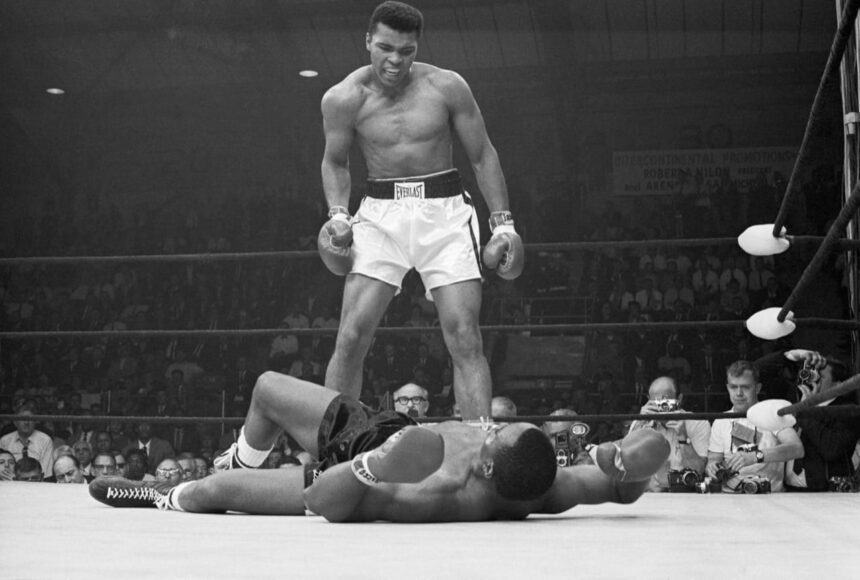When you speak of boxing, one name inevitably echoes louder than the rest: Muhammad Ali. Renowned not just for his extraordinary prowess in the ring but also for his charismatic personality and profound impact on society, Ali transformed the landscape of sports and culture. His famous proclamation, “I am the greatest,” was not mere bravado but a premonition that he fulfilled time and again through historic fights and humanitarian efforts. This article delves into the life of Muhammad Ali, exploring his journey from a young boxer in Louisville, Kentucky, to a global icon who transcended the confines of sport.
Early Life and Background
Born Cassius Marcellus Clay Jr. on January 17, 1942, in Louisville, Kentucky, Muhammad Ali was not just a child with a gift for boxing but a spirited young man keenly aware of the world’s complexities. His baptism into boxing was as serendipitous as it was destined; after his bicycle was stolen, a young Cassius was advised by a police officer to learn boxing. Under the tutelage of coach Fred Stoner, he quickly excelled, showing early signs of the speed and agility that would later define his career. His early life in the segregated South also shaped his perspectives on justice and equality, themes he would passionately advocate throughout his life.
Rise in Sports / Career Highlights
Ali’s career took a meteoric rise after he won a gold medal in the light heavyweight division at the 1960 Rome Olympics. Turning professional shortly after, he stunned the world by defeating the heavily favored Sonny Liston in 1964 to claim the heavyweight championship. His unorthodox fighting style, characterized by astounding speed, precision, and his famous “float like a butterfly, sting like a bee” approach, revolutionized boxing techniques.
Achievements and Notable Records
Throughout his illustrious career, Ali amassed a record of 56 wins, five losses, and 37 knockouts. He was the first fighter to capture the heavyweight title three times, a testament to his resilience and enduring skill. Notable bouts that underscore his legacy include the “Fight of the Century” against Joe Frazier, the “Rumble in the Jungle” with George Foreman, and the “Thrilla in Manila,” again against Frazier. Each fight not only showcased his skill but also his strategic brilliance and physical endurance.
Beyond the Game
Ali’s influence was never confined to the boxing ring. He was a prominent civil rights advocate and a vocal critic of the Vietnam War, famously stating, “I ain’t got no quarrel with them Viet Cong.” His conversion to Islam and name change in 1964 marked a significant turn in his personal and public life, bringing attention to religious freedom and racial justice. Later, his philanthropic efforts included support for Parkinson’s research and humanitarian initiatives worldwide.
Challenges and Controversies
Ali faced numerous challenges, both from within and outside the sports world. His refusal to be drafted into the U.S. military citing religious reasons led to a three-year ban from boxing and a legal battle that went to the Supreme Court, where he was eventually vindicated. His outspokenness on racial injustice and his conversion to Islam also drew criticism, yet he remained unwavering in his beliefs and actions.
Legacy and Impact
Muhammad Ali left an indelible mark not only on boxing but also on global culture. His contributions to civil rights and his role as a messenger for peace have inspired countless individuals. His charisma and conviction have made him a hero to many, transcending the usual accolades attributed to sports figures.
Fun Facts & Trivia
– Ali recorded two spoken word albums and received two Grammy nominations.
– He starred in the Broadway musical, “Buck White.”
– Ali was known for his witty and often poetic trash talk before his fights.
– He was selected to light the Olympic torch at the 1996 Atlanta Games.
– Despite his Parkinson’s syndrome, Ali remained active in public life, advocating for various causes until his death in 2016.
Muhammad Ali’s journey from a young boxer to a world statesman demonstrates the power of sport as a platform for profound societal impact. His legacy as “The Greatest” lives on, not just in the ring, but in the hearts of millions who were inspired by his courage, talent, and conviction.








